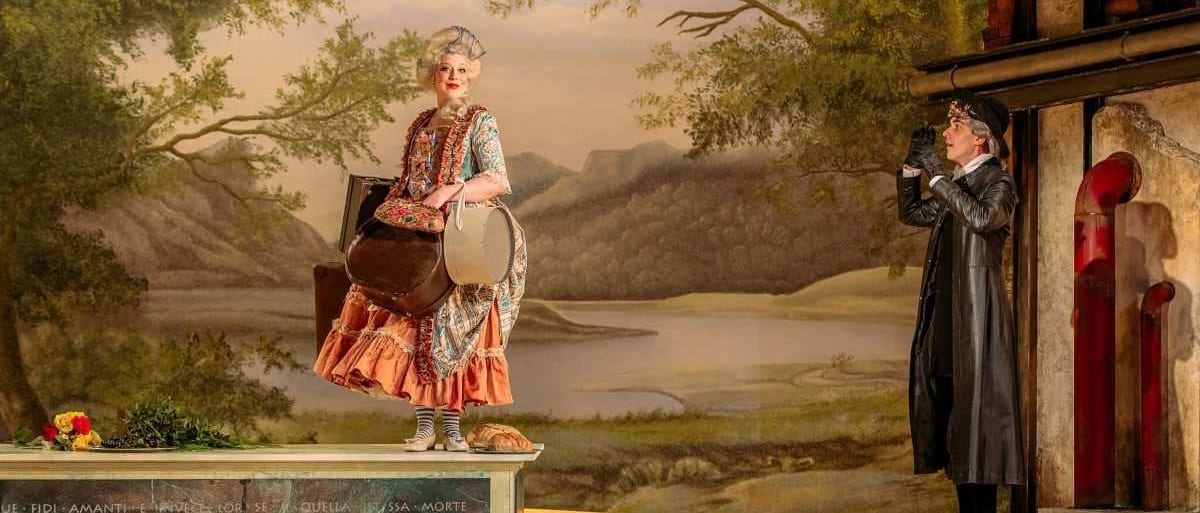Haydn’s operas rarely get the outings they deserve, and the responsibility for that lies (unintentionally) with Mozart. So much that we take for granted in the four Da Ponte operas is already visible in Haydn’s work; but because these earlier inspirations for the younger composer do not reach the same level of sustained creative intensity and structural innovation they are often passed over. For a better understanding of both composers this neglect really should be put right and this particular production makes the best case possible for a work that was first performed only four years before ‘Figaro’.
Part of the problem was that Haydn wrote these works without expecting to hear them again – they were part of his endeavours on behalf of the Esterházy family and not commercial ventures. Therefore, though they are teeming with orchestral and vocal invention they were never subject to the refining process of revision that tempered other contemporary operatic composers such as Gluck and Mozart himself. This means that while there is one enchanting episode after another, rarely are they more than the sum of their glittering parts.
This is certainly true of La Fedeltà Premiata, which slides uneasily between pastoral romance, romantic comedy and tragic intensity throughout its course with a plot of more than usually confected absurdity to guide it. But the musical riches are such that with good singer-actors and carefully considered lighting, set and design and costume, it can still succeed very well across an evening. So it does here in the safe hands of experience director Stephen Barlow and his immaculately tasteful creative team.
We are in ‘Arcadia’, but despite a pastel backdrop in the style of Claude, a set that shades from classical architecture into picturesque poverty, and exquisitely atmospheric lighting throughout (the work of David Howe) all is not well. The goddess Diana is offended and has decreed that each year two lovers must be sacrificed to a resident monster she has imposed on them (and which makes a series of impressive tentacular appearances at moments of high emotion!)
A band of lovers, some opportunistic and others overly intense are scrambled and unscrambled again prompted by the machinations of a high priest (Adam Maxey ) who seems to anticipate Don Alfonso in ‘Così’ just as the pairs of lovers seem to pre-echo the cynicism and hard-won self-knowledge of Mozart’s soldiers and their partners. And at the other end of the emotional spectrum, particularly in the second half, there are self-contained cantata-like scenes of deep emotional exploration that seem to suggest Donna Anna and Don Ottavio from ‘Don Giovanni’ or the Countess in ‘Figaro’.
Nor is there any absence of orchestral virtuosity. Alice Farnham conjures a fierce concerted storm and episodes of rare pastoral repose from the student orchestra, who get off to a virtuoso start with an overture that we also know as a symphonic movement, such is its complexity. We also get to hear from some superb instrumental soloists: as usual in Haydn there is a lot for the horns to do, and the flautist was promoted to play his solos as an actor in the drama, adding to the Arcadian atmosphere. With so many opportunities for every kind of performer, player and technician to shine this is in so many ways a perfect choice for a conservatoire production such as this.
There are no weak links in the excellent cast either in technical vocal production or acting chops. Purely in terms of vocal tone, the women were generally more characterful and dramatically engaging, while some of the men indulged in a tad too much tenorial sobbing for this reviewer’s taste. There were a few outstanding performances that do need a special mention (speaking of the first cast on this particular night). Lara Marie Müller, Emma Nikolovska, and Eline Vandenheede provided three highly contrasted heroines, with equal amounts of busy recitative to bring to life and showpiece arias to perform. Matthew Palmer carried on his excellent work from ‘Venus and Adonis’, with a characterisation of a louche aristocrat with an eye for escapade which held our attention with comic flair. All of them are singers to look out for in the future. The chorus were excellent throughout, acting vividly and moving naturally on a crowded stage.
This was a hugely rewarding evening both musically and dramatically as we watched Haydn’s characters elegantly striving to escape the bonds of the Baroque into foreshadowings of Mozart- like Michelangelo’s Slaves moving from marble into mortal shape.

